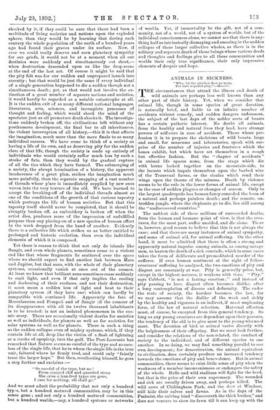COLLECTIVE DEATH.
THE rumour, very possibly more or less exaggerated, of the total disappearance of an island said to be twenty-five miles by fifteen in area,—more than half as large again as the Isle of Man,—with a population of twelve thousand people, owing to a great volcanic eruption which had strewn the sea for many miles with volcanic debris, renders it probable that the extinction of Herculaneum and Pompeii is not at all events a unique event in the history of our planet. Bishop Butler once speculated on the probability that a whole corporation might go mad at once. Certainly a more probable event would be the death of a community,—which has, indeed, happened in this case if Sangir has really been totally destroyed with all its twelve thousand people. It is curious how much more the imagination is impressed by the sudden decease of a whole society, than by its gradual decease spread over a long term of years, with the gradual substitution of the children, in the places and dirties filled by the parents. In the latter case, the society does not die, but is in a constant condition of dissolution and reproduction. But why should it be so much less shocking to think of the never-ceasing death and renewal of a society, than of its instantaneous and com- plete disappearance from the earth P Is it simply that we are well accustomed to the one and not to the other If that were all, we ought to be much more horrified at the decease of a whole family than at the decease of the most important members of it ; yet there is often a tragedy in the latter case which there cannot be in the former, where there are no mourners left to feel the pangs of separation. It is more impressive to see the total blasting of a tree than to see its leaves drop off one by one ; but then, that is because, in the latter case, the trunk survives, and we think of the trunk as the living thing, and of the leaves as merely some of the manifestations of its life. But as all the population of any country at any one moment dies sooner or later, the mere fact that they leave suc- cessors behind them, who in their turn also die, only cumulates the death-prospect. And though it cumulates also the birth- prospect, there is nothing surely in the expectation of in- numerable births to render less awful the prospect of the collective death of all the persons now alive. Indeed, to our mind, their simultaneous death is not more but rather less awful than their gradual dropping off in groups and units. Deaths that leave a blank behind them are much more awful than deaths which leave no sense of blank. If Sangir really perished out of the earth at one fell blow, there was hardly any pang inflicted,—none that would compare with the pangs which the death of the same number of people in the ordinary way would necessarily inflict. It was said of Saul and Jonathan that they were lovely and pleasant in their lives, and in their deaths they were not divided. And if that could be said of the whole population of any fragment of the earth, there would be, not a greater, but a much less cloud of woe, though a less benignant cloud of promise also, hanging over the future of that portion of the earth than over any similar fraction of the remainder. Collective death, though it is a phenomenon to which we are hardly at all accustomed, is surely a very much less painful prospect than the ordinary human inheritance of incessantly recurring grief and parting.
We suppose it is, in the main, the mere magnitude of the phenomenon of collective death which impresses us. Subdivided into innumerable units of loss and vanishings, the imagination is not staggered as it is by the sudden gathering to a single focus, of some twelve thousand scenes of dark and painful experience, though the mere convergence of all of them in the same point, really implies, not a vast increase, but a vast diminution of the sum-total of earthly lamentation. If the earth were suddenly scattered into a thousand fragments, as some one of the planets probably has been in that intervening space between Mars and Jupiter in which all the planetoids revolve, the catastrophe would bring much less trouble and dismay to men than would be the inevitable result of the gradual decay and death of all the beings existing on the earth at the moment when the supposed catastrophe occurred. Yet, if there could be any planetary spectators of like constitution to ourselves (say on Mars), of such a catastrophe, they would be much more
shocked by it, if they could be mire that there had been a multitude of living societies and nations upon the exploded sphere, than they would be by learning that during each century the whole population of the earth of a hundred years ago had found their graves under its surface. Now, if ever we could really deserve and earn planetary sympathy for our griefs, it would not be at a moment when all our destinies were suddenly and simultaneously cut short,— when destruction descended upon us like the drop-scene at the end of the last act. Of course it might be said that the pity felt was for our sudden and unprepared launch into eternity ; but that would be just the same if every individual of a single generation happened to die a sudden though not a simultaneous death; yet, as that would not involve the ex- tinction of a great number of separate nations and societies, it would hardly be regarded as a notable catastrophe at all.
It is the sudden exit of so many different national languages, literatures, arts, sciences, and incomplete processes of thought and feeling, which would shock the mind of the spectator just as all premature death shocks it. The investiga- tions suddenly broken off, the civilisations left without any posthumous development, the final bar to all inheritances, the violent interruption of all history,—this it is that affects the imagination, much more than the mere finale to so many individual careers. We have come to think of a society as having a life of its own, and as deserving pity for the sudden close of that life, though the society is made up entirely of individuals who would certainly suffer much less by such a stroke of fate, than they would by the gradual rupture of all the ties which they have formed. The submerging of a society, the abrupt termination of a history, the apparent incoherence of a great plan, strikes the imagination much more painfully, than the separate snapping of a vast number of threads whose place is immediately supplied by new ones woven into the very texture of the old. We have learned to accept the breaking-off of the individual threads almost as one of the conditions of the growth of that curious tapestry which portrays the life of human societies. But that this tapestry itself should never be completed, that it should be abruptly broken off, as embroidery is broken off when the artist dies, produces more of the impression of unfulfilled purpose than any piecing-on of a new species of human effort to the work dropped from the hand of another. Evidently there is a collective life which strikes us as better entitled to prolonged and historic evolution, than even the individual elements of which it is composed.
Yet there is reason to think that not only do islands like Sangir, and even whole planets, sometimes come to a violent end like that whose fragments lie scattered over the space where we should expect to find another link between Mars and Jupiter, but that suns, with the whole of their planetary systems, occasionally vanish at once out of the cosmos.
At least we know that brilliant suns sometimes cease suddenly to emit light, and even if that only implies the cooling and darkening of their surfaces, and not their destruction, it must mean a sudden loss of light and heat to their planetary system (if they have one) which can hardly be
compatible with continued life. Apparently the fate of Herculaneum and Pompeii and of Sangir (if the rumour of its disappearance with all its twelve thousand inhabitants is to be trusted) is not an isolated phenomenon in the cos- mic story. There are occasionally violent deaths for societies as well as individuals, for planets as well as for societies, for solar systems as well as for planets. There is such a thing as the sudden collapse even of mighty systems, which, if they contain life at all, drop like the victim of a flash of lightning
or a stroke of apoplexy, into the gulf. The Poet-Laureate has
remarked that Nature seems so careful of the type and so care- less of the single life, that he to whom the single life is the true unit, faltered where he firmly trod, and could only "faintly trust the larger hope." But then, recollecting himself, he goes a step further and exclaims :—
" So careful of the type, but no !
From scarped cliff and quarried stone She cries a hundred types are gone, I care for nothing, all shall go."
And we must admit the probability that not only a hundred
types, but a hundred matured communities, may be in this sense gone ; and not only a hundred matured communities,
but a hundred worlds,—nay, a hundred systems or networks
of worlds. Yet, if immortality be the gift, not of a com- munity, not of a world, not of a system of worlds, but of the individual consciousness alone, we cannot see that there is any- thing half so intrinsically dismaying and amazing in the sudden collapse of these larger collective wholes, as there is in the solitary and separate death of those beings whose various deeds and thoughts and feelings give to all these communities and worlds their only true significance, their only impressive elements of despair and hope.



































 Previous page
Previous page